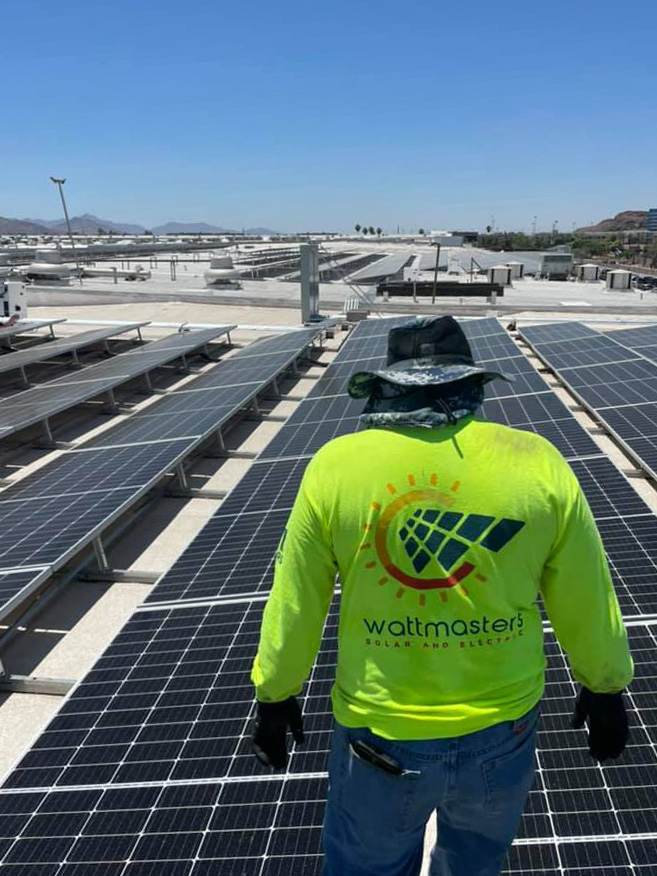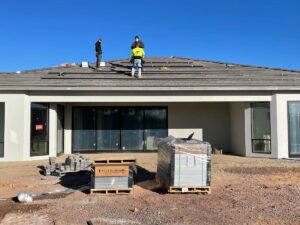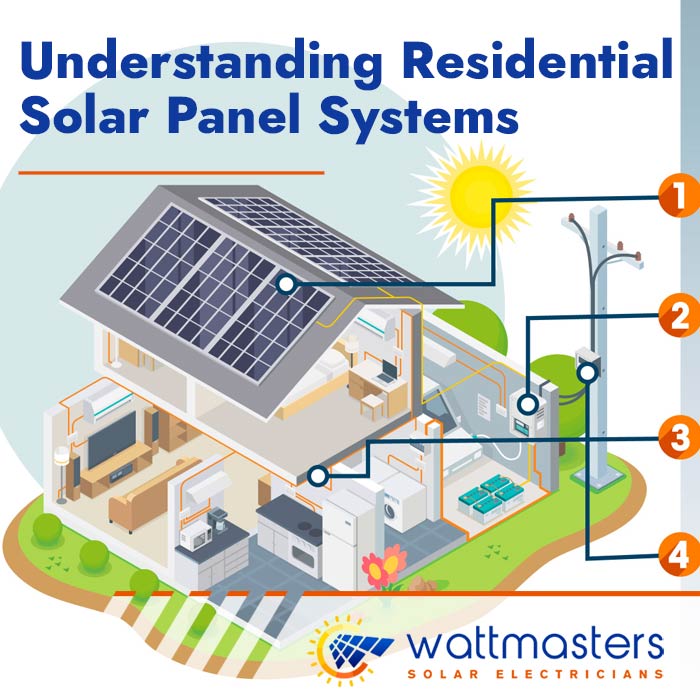The benefits of installing a solar panel system on your home are many, from the savings on your power bill to the environment-friendly practices that you can engage in. Here’s a blog article that offers some insights into understanding residential solar panel installation.
What is Residential Solar?
Residential solar is a growing trend in the US that is seeing more and more people take advantage of the benefits of solar energy. Solar panels are typically installed on roofs of homes or businesses to convert sunlight into electricity. This electricity can then be used to power lighting, appliances, and other devices in the home or business.
There are many reasons why residential solar is becoming increasingly popular.
For one, solar panels are an affordable way to reduce your energy costs. In some cases, you can wipe out your entire energy bill AND get paid for generating extra electricity through net metering! Residential solar panels truly put the “power” back into a homeowner’s control.
Additionally, solar panels can provide a sense of independence and security by providing your own source of renewable energy.
As homeowners increasingly seek sustainable and cost-effective energy solutions, residential solar panel systems have surged in popularity. Understanding how these systems work and their benefits is essential for anyone considering a transition to solar power, especially when considering solar companies in Phoenix or solar installers in Phoenix.
Finally, solar panels can also help reduce greenhouse gas emissions by generating electricity from clean sources.
Residential solar panel systems are setups that convert sunlight into electricity for home use. These systems typically consist of solar panels, an inverter, a battery, and a monitoring system. They can either be grid-tied, allowing for the exchange of electricity with the local grid, or off-grid, completely independent systems. This brings into question, “Are Solar Panels Worth It in Arizona?”
If you are thinking about installing residential solar panels, there are a few things that you should keep in mind:
- First, you will need to determine whether or not your home or business qualifies for Solar PV installation.
- Next, you will need to find a qualified solar installer who can help you install the appropriate type of solar panels for your needs.
- Finally, you will need to factor in any associated costs such as installation fees, permits, and taxes.
Solar Panel System Components
Solar Panels: The most visible part of the system, these panels contain photovoltaic (PV) cells that convert sunlight into direct current (DC) electricity.
Inverter: This device converts DC electricity from the panels into alternating current (AC), which is used by most home appliances.
Battery Storage (Optional): Batteries can store solar energy, providing power during nights or cloudy days. This feature is particularly important for systems integrated with EV Charging Station Contractors.
Monitoring System: Allows homeowners to track the performance and output of their solar panels, especially crucial in commercial solar installation scenarios.
Benefits of Installing Solar Panels
Decreased Energy Bills: Solar panels have the potential to completely eliminate or drastically reduce monthly electricity bills.
Environmental Impact: By reducing dependency on fossil fuels and carbon emissions, solar energy is a clean, sustainable resource.
Enhanced Property Value: Solar-powered homes are frequently worth more and are more appealing to prospective purchasers.
Energy independence: Energy independence lessens reliance on utility providers and increases resilience to changes in energy costs.
Rebates & Incentives: To lower the cost of installing solar panels, several governments provide credits, rebates, and tax breaks.
Types of Solar Panels
Grid-Tied Systems: These systems are linked to the nearby power grid and have the ability to transfer surplus electricity back to it, frequently gaining credits in the process (net metering).
Off-Grid Systems: Fully self-sufficient, needing extra generators sometimes and battery storage.
Hybrid systems: Hybrid systems combine the best aspects of off-grid and grid-tied systems, offering dependability and flexibility.
Considerations Before Installation
Rooftop Condition and Space: Guarantee the rooftop is looking great and has adequate room for the quantity of boards required.
Neighborhood Environment: While sunlight powered chargers can work in different environments, their effectiveness can change in view of daylight accessibility.
Energy Needs: Evaluate your home’s energy utilization to decide the size of the framework required.
Cost and Funding: Think about the underlying venture, accessible supporting choices, and long haul investment funds.
Establishment and Upkeep: Pick a trustworthy installer, similar to those work in Tesla Charger establishment in Phoenix, and grasp the support prerequisites of your framework.
Installation Process
Solar installations can be daunting, but with a little planning and preparation, they can be a very easy and pleasant process. Let’s discuss the installation process for residential solar systems.
There are a few things you should plan on before starting your solar installation:
1 – research your local utility rates and see if solar is a cost-effective option for you
2 – decide how much power you need and how large of a system you want
3 – get an estimate from your solar installer or contractor
4 – gather any other pertinent information about your home (e.g. roof type, insulation levels) .The next step is to gather the materials necessary for your installation.
Unless you’re planning on installing the solar panel system yourself, we highly recommend choosing a highly experienced licensed solar installer with lots of great reviews who will figure out all of the important details FOR YOU – from permits to system size, gathering the best and most compatible solar equipment, to installing and warrantying their workmanship.


The Cost of a Residential Solar Installation
If you’re like most homeowners, solar is something you’ve considered but never taken the plunge. If you’re looking to install solar panels on your home, however, it’s important to understand the cost of a residential solar installation in Phoenix and the surrounding cities.
Here are a few things to consider when calculating the price of solar:
1) Size of Solar System: The more panels your system has, the more electricity it can generate. However, bigger systems also tend to cost more. A 1-kilowatt installation will typically cost around $12,000, while a 10-kilowatt system will run you about $24,000. Check with your local installer to get an estimate for your specific situation.
2) Location of Solar System: Your solar system will produce the most electricity in direct sunlight. However, if your home is in an area that receives less light (due to shade or tall buildings), your system may not be as efficient and may end up costing you more. Ask your installer how much extra you’ll have to pay for a system that’s installed in a location with less sunlight. Or perhaps a ground mounted system would be a better option in this case.
3) Financing Options: Some homebuyers are eligible for tax credits or grants that can lower the overall cost of your solar panel system. In 2022, you can save up to 26% off with tax incentives!
4) Solar panels with battery backup will save you the most money overall. Think about it: unless you live in Alaska, the sun doesn’t shine at night. Rather than paying to pull electricity from the grid, you can draw from your solar battery backup storage! Free electric, 24/7.
Pros and Cons of the Residential Solar Installations
The Pros and Cons of Residential Solar Installations are vast and varied, as is the case for any type of solar installation. One thing to keep in mind is that residential solar installations may be more expensive up front, but can save you significant money over the long haul. That said, the average time a solar panel system pays for itself in Phoenix is about 7 years, 10 at most.
Additionally, depending on your location and roof type, a residential solar installation may provide benefits like lower energy bills, reduced reliance on fossil fuels, and even job creation in your local community.
On the other hand, residential solar installations can also have some drawbacks. For example, if your roof is not suitable for solar panels (due to its orientation or size), you may not be able to install them.
Furthermore, if there is heavy cloud cover or darkness during certain hours of the day, your solar panels may not produce enough electricity to offset your regular energy bill.
Overall, whether you’re considering installing residential solar panels on your home or business property, it’s important to weigh the pros and cons carefully to see if they’re right for you. This is where having a solar installer with strong integrity (not strong sales skills) come out to evaluate your home or business and provide an honest assessment and recommendation for you.
Watt Masters family-owned and operated solar installation company has been faithfully serving the greater Phoenix area since 1999. It is our strong integrity, friendly service, and quality workmanship that has kept us in business this long, and with such a great reputation and best solar installer in Phoenix reviews.
Conclusion
Residential solar panel systems offer an eco-friendly and cost-effective way to meet energy needs. By understanding their components, benefits, and the considerations involved in installation, homeowners can make informed decisions about transitioning to solar energy. Embracing solar power is not just a personal or financial choice; it’s a step towards a more sustainable future. When looking for solar companies near me in Phoenix, it’s essential to consider all these factors to make the most informed decision.
Contents
- 1 What is Residential Solar?
- 2 Solar Panel System Components
- 3 Benefits of Installing Solar Panels
- 4 Types of Solar Panels
- 5 Considerations Before Installation
- 6 Installation Process
- 7 The Cost of a Residential Solar Installation
- 8 Pros and Cons of the Residential Solar Installations
- 9 Conclusion
- 10 Say goodbye to expensive electric bills with $0 down solar from Watt Masters

